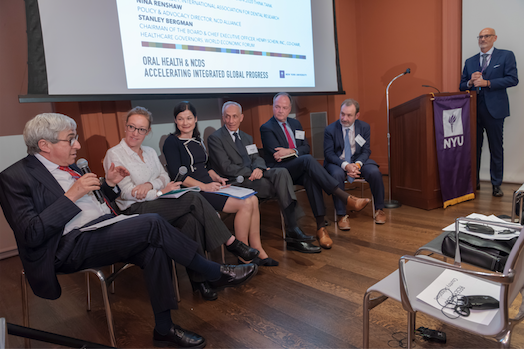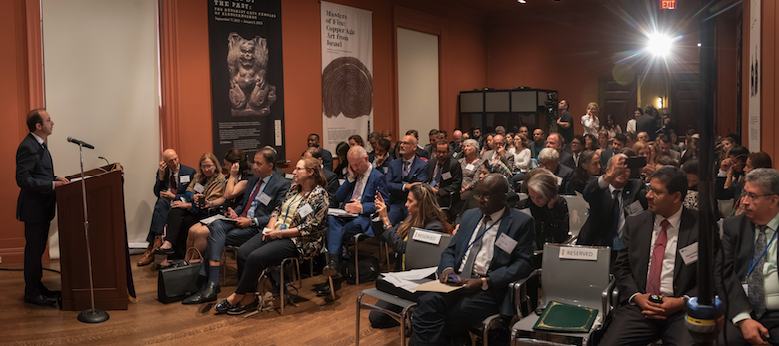
Oral diseases—which affect half of the world’s population—are rarely included in noncommunicable disease prevention efforts. The event promoted the integration of oral health in all efforts to prevent and control noncommunicable diseases. “Good oral health is a crucial element of overall health and, as such, part of the human right to health,” said Svetlana Axelrod, the WHO Assistant Director General for Noncommunicable Diseases and Mental Health, during her keynote address at the event.
To ensure that oral health is no longer neglected on the global health agenda, Axelrod called upon UN Member States, the oral health community, and other stakeholders to strengthen their commitment to address oral health as a priority area. This includes integrating oral disease prevention with the prevention of noncommunicable diseases by addressing common risk factors. She also encouraged countries to mobilize resources to enhance collaborations and partnerships to implement cost-effective oral health interventions. Finally, Axelrod urged countries “to include essential oral health care services as part of Universal Health Coverage initiatives to ensure that no one is left behind.”
“The NYU College of Dentistry WHO Collaborating Center, in tandem with the NYU College of Global Public Health, is ready to provide technical expertise and capacity building to improve oral health globally,” said Richard Niederman, chair of the Department of Epidemiology & Health Promotion at the NYU College of Dentistry and director of the WHO Collaborating Center.
“There is no other disease on the planet as common as untreated tooth decay. Yet, the United Nations’ 3rd High-Level Meeting on NCDs failed to recognize oral diseases. Thus, the side event was even more important to raise their importance in the noncommunicable disease context,” said event moderator and convener Habib Benzian, adjunct professor at NYU’s Colleges of Dentistry and Global Public Health and associate director of global health and policy for NYU Dentistry’s WHO Collaborating Center.
The side event was co-sponsored by the Minister of Health of the Kingdom of Morocco, Anass Doukkali, and Isaïe Medah, Director General of Public Health in Burkina Faso representing Minister of Health Nicolas Meda. They shared their respective countries’ work on noncommunicable diseases and oral health and pledged increased attention to the growing burden of oral diseases. Colgate-Palmolive and Henry Schein, Inc. provided support for the event.
Event attendees also heard from public health advocates and international oral health experts. Discussing the global public health challenges of oral diseases, Richard Watt of the University College London, highlighted the massive global disease burden and the need to include oral health in upstream policy measures. Stefan Listl of Radboud University in the Netherlands emphasized that prevention is possible and highly cost-effective. He also warned that inaction on oral diseases will be costly to all health systems and will lead to high patient out-of-pocket payments that may contribute to increased impoverishment.
In a series of presentations about how public health efforts on oral health and noncommunicable diseases can be integrated, Paula Moynihan of Newcastle University, who directs the WHO Collaborating Center for Nutrition and Oral Health, spoke of how the relation between tooth decay and sugar intake informed the WHO sugar guidelines that recommends levels of sugar intake. This was reinforced by Francesco Branca, WHO Director of Nutrition for Health & Development, who acknowledged that nutrition and sugar intake are major common risk factors for noncommunicable diseases and oral health that require joint policy responses.
NYU Dentistry’s Niederman made a case for early and low-cost investments in prevention to address the global epidemic of tooth decay, and affirmed the WHO Collaborating Center’s commitment to improving oral health worldwide.
“Next year’s UN High-Level Meeting on Universal Health Coverage will provide another opportunity to join forces and to make essential oral health care available and affordable for everyone,” added Niederman.
The event concluded with a panel discussion involving representatives from different sectors and stakeholder groups to explore what each sector—government, professional, corporate, civil society, academia, and research—can contribute in order to end the global neglect of oral health. The panelists included Chris Dickey of NYU College of Global Public Health, Michael Glick of FDI World Dental Federation, Nina Renshaw of the NCD Alliance, President-elect Paula Moynihan of the International Association of Dental Research (IADR), and Stanley Bergman, Chairman of the Board and CEO, Henry Schein, Inc. They agreed on the importance of collaboration between sectors and discussed pathways to jointly and effectively accelerate tangible global and local action on oral health.
NYU Dentistry’s WHO Collaborating Center—the only WHO Collaborating Center on oral health in the Americas—aims to foster oral health policy dialogue globally and the translation of evidence into practice.
Images: ©Sorel: Courtesy of NYU Photo Bureau





